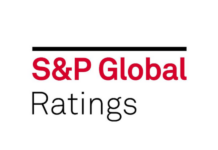Brenden Kugle and Patrick Drury Byrne of S&P Global Ratings, have published a new paper assessing the borrowing costs for ‘fallen angels’, corporates whose credit ratings have fallen to speculative grade.
“Despite the narrowing in absolute credit spreads in the first half of 2024, since 2013 the cost of falling to, or close to, speculative-grade (‘BB+’ or lower) has been very high,” they write. “The percentage differential in spreads across all rating levels peaks between ‘BBB-‘ and ‘BBB’, at 28%. This is a notch above the actual tipping point into speculative-grade, where the percentage differential also remains elevated at 25%. While absolute spreads have narrowed, the data suggests investors remain highly cautious about fallen angel risk and seek to adjust credit risk pricing accordingly.”
Given the current uncertain rates environment and the concerns around increased pressure on cashflows. They not that no clear correlation exists between a higher federal funds rate and the cost of becoming a fallen angel, however costs for a fallen angel can be “exceptionally volatile” during recessions – and the possibility of a US recession has risen 25%-30% in S&P Global Ratings economists’ most recent estimate, from a low base.
“The cost of a notch has narrowed markedly over the last year across nearly all rating transitions,” they write. “Despite higher interest rates and simmering geopolitical risk, the cost of falling to speculative-grade declined by about 20 bps, or 38% year over year. Over the last 12 months, ‘BB+’ rather than ‘BBB-‘ spread tightening has been the key driver narrowing the gap in this rating transition. In addition, the relative dearth of fallen angels compared to rising stars–issuers upgraded to investment-grade from speculative-grade–since the beginning of 2023 may play a role. At a high level, a lack of fallen angels would likely lower the cost of falling to ‘BB+’ from ‘BBB-‘, whereas an increase in fallen angels would probably increase this cost. Another explanation could be the lack of speculative-grade bond supply through late 2023, which has only recently picked up in the first half of 2024.”
©Markets Media Europe 2025


























